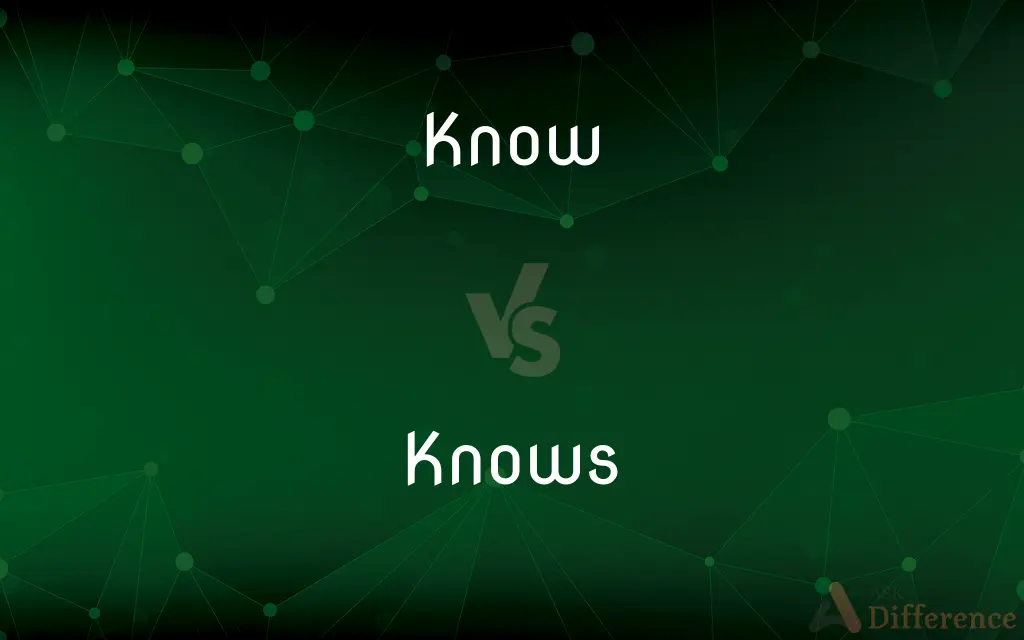Know vs. Knows — What's the Difference?
By Tayyaba Rehman & Fiza Rafique — Updated on April 2, 2024
"Know" is the base form of the verb, used with plural subjects or in the infinitive form, while "knows" is the third person singular present tense form.

Difference Between Know and Knows
Table of Contents
ADVERTISEMENT
Key Differences
"Know" is the unconjugated form of the verb, applicable in various grammatical structures. It's used with subjects such as "I," "you," "we," and "they," or in the infinitive form, such as "to know." "Knows" is the conjugated form of "know" for the third person singular present tense, which means it's used with he, she, or it as the subject.
Know denotes having knowledge or awareness about something. For example, "I know the answer" or "To know oneself is true wisdom." Knows also expresses possession of knowledge or awareness, but specifically when referring to a single entity other than the speaker or the addressee. For instance, "He knows the secret" or "It knows what to do."
In the context of usage, "know" is versatile, appearing in various tenses and constructions depending on the subject and the sentence structure. This flexibility allows it to be used in commands, questions, and statements, adapting to the number and perspective of the subject. "Do you know the way?" and "We know the risks" showcase its adaptability. Conversely, "knows" is restricted in its application, only fitting within sentences where a singular third-person subject is present. This limitation means that "knows" cannot be used interchangeably with "know" without altering the subject of the sentence or the tense. Its specificity lends clarity to sentences, ensuring the subject's singularity is understood, as in "She knows the importance of timing."
Understanding the difference between "know" and "knows" is essential for proper verb conjugation and subject-verb agreement in English. Misusing them can lead to grammatical errors and confusion regarding the sentence's subject. Correct usage depends on the subject's number (singular or plural) and person (first, second, or third), crucial for effective communication.
Comparison Chart
Form
Base form of the verb.
Third person singular present tense form.
ADVERTISEMENT
Usage with
"I," "you," "we," "they," and infinitive form.
"He," "she," "it."
Example
"I know the answer."
"She knows the answer."
Grammatical Role
Used in various tenses and constructions.
Used specifically in present tense.
Flexibility
Versatile, used in questions, commands, etc.
Restricted, used with singular third-person subjects.
Compare with Definitions
Know
Often used after modal verbs.
To know him is to love him.
Knows
Indicates singular subject’s knowledge in the present.
She knows what to do.
Know
Used with plural subjects or in non-finite constructions.
I know how to swim.
Knows
Restricted to specific subject-verb agreement.
The cat knows where to find its food.
Know
Adapts to various sentence structures and tenses.
Do you know the truth?
Knows
Expresses current awareness or understanding.
It knows the way home.
Know
Appears in imperatives and interrogatives.
Know your limits.
Knows
Used with he, she, or it in present tense.
He knows the answer.
Know
Conveys a broad sense of understanding or awareness.
We know the risks involved.
Knows
Clarifies the subject is singular and present.
Everyone knows the importance of timing.
Know
Be aware of through observation, inquiry, or information
I know what I'm doing
Most people know that CFCs can damage the ozone layer
Knows
To perceive directly; grasp in the mind with clarity or certainty.
Know
Have developed a relationship with (someone) through meeting and spending time with them; be familiar or friendly with
He knew and respected Laura
Knows
To regard as true beyond doubt
I know she won't fail.
Know
To perceive directly; grasp in the mind with clarity or certainty.
Knows
To have a practical understanding of, as through experience; be skilled in
Knows how to cook.
Know
To regard as true beyond doubt
I know she won't fail.
Knows
To have fixed in the mind
Knows her Latin verbs.
Know
To have a practical understanding of, as through experience; be skilled in
Knows how to cook.
Knows
To have experience of
“a black stubble that had known no razor” (William Faulkner).
Know
To have fixed in the mind
Knows her Latin verbs.
Knows
To perceive as familiar; recognize
I know that face.
Know
To have experience of
“a black stubble that had known no razor” (William Faulkner).
Knows
To be acquainted with
He doesn't know his neighbors.
Know
To perceive as familiar; recognize
I know that face.
Knows
To be able to distinguish; recognize as distinct
Knows right from wrong.
Know
To be acquainted with
He doesn't know his neighbors.
Knows
To discern the character or nature of
Knew him for a liar.
Know
To be able to distinguish; recognize as distinct
Knows right from wrong.
Knows
To possess knowledge, understanding, or information.
Know
(Archaic) To have sexual intercourse with.
Knows
To be cognizant or aware.
Know
To possess knowledge, understanding, or information.
Knows
(nonstandard) All persons, singular and plural, present form of know.
I knows just what they knows.
Know
To be cognizant or aware.
Knows
Plural of know
Know
(transitive) To perceive the truth or factuality of; to be certain of or that.
I know that I’m right and you’re wrong.
He knew something terrible was going to happen.
Know
(transitive) To be aware of; to be cognizant of.
Did you know Michelle and Jack were getting divorced? ― Yes, I knew.
She knows where I live.
I knew he was upset, but I didn't understand why.
Know
(transitive) To be acquainted or familiar with; to have encountered.
I know your mother, but I’ve never met your father.
Know
(transitive) To experience.
Their relationship knew ups and downs.
Know
(transitive) To be able to distinguish, to discern, particularly by contrast or comparison; to recognize the nature of.}}
To know a person's face or figure
To know right from wrong
I wouldn't know one from the other.
Know
(transitive) To recognize as the same (as someone or something previously encountered) after an absence or change.
Know
To understand or have a grasp of through experience or study.
Let me do it. I know how it works.
She knows how to swim.
His mother tongue is Italian, but he also knows French and English.
She knows chemistry better than anybody else.
Know your enemy and know yourself.
Know
(intransitive) To have knowledge; to have information, be informed.
It is vital that he not know.
She knew of our plan.
He knows about 19th century politics.
Know
(intransitive) To be or become aware or cognizant.
Did you know Michelle and Jack were getting divorced? ― Yes, I knew.
Know
To be acquainted (with another person).
Know
(transitive) To be able to play or perform (a song or other piece of music).
Do you know "Blueberry Hill"?
Know
(rare) Knowledge; the state of knowing.
Know
Knowledge; the state of knowing; now confined to the fixed phrase ‘in the know’
Know
Knee.
Know
To perceive or apprehend clearly and certainly; to understand; to have full information of; as, to know one's duty.
O, that a man might knowThe end of this day's business ere it come!
There is a certainty in the proposition, and we know it.
Know how sublime a thing it isTo suffer and be strong.
Know
To be convinced of the truth of; to be fully assured of; as, to know things from information.
Know
To be acquainted with; to be no stranger to; to be more or less familiar with the person, character, etc., of; to possess experience of; as, to know an author; to know the rules of an organization.
He hath made him to be sin for us, who knew no sin.
Not to know me argues yourselves unknown.
Know
To recognize; to distinguish; to discern the character of; as, to know a person's face or figure.
Ye shall know them by their fruits.
And their eyes were opened, and they knew him.
To knowFaithful friend from flattering foe.
At nearer view he thought he knew the dead.
Know
To have knowledge; to have a clear and certain perception; to possess wisdom, instruction, or information; - often with of.
Israel doth not know, my people doth not consider.
If any man will do his will, he shall know of the doctrine, whether it be of God, or whether I speak of myself.
The peasant folklore of Europe still knows of willows that bleed and weep and speak when hewn.
Know
To be assured; to feel confident.
Know
Be cognizant or aware of a fact or a specific piece of information; possess knowledge or information about;
I know that the President lied to the people
I want to know who is winning the game!
I know it's time
Know
Know how to do or perform something;
She knows how to knit
Does your husband know how to cook?
Know
Be aware of the truth of something; have a belief or faith in something; regard as true beyond any doubt;
I know that I left the key on the table
Galileo knew that the earth moves around the sun
Know
Be familiar or acquainted with a person or an object;
She doesn't know this composer
Do you know my sister?
We know this movie
I know him under a different name
This flower is known as a Peruvian Lily
Know
Have firsthand knowledge of states, situations, emotions, or sensations;
I know the feeling!
Have you ever known hunger?
I have lived a kind of hell when I was a drug addict
The holocaust survivors have lived a nightmare
I lived through two divorces
Know
Accept (someone) to be what is claimed or accept his power and authority;
The Crown Prince was acknowledged as the true heir to the throne
We do not recognize your gods
Know
Have fixed in the mind;
I know Latin
This student knows her irregular verbs
Do you know the poem well enough to recite it?
Know
Know the nature or character of;
We all knew her as a big show-off
Know
Be able to distinguish, recognize as being different;
The child knows right from wrong
Know
Perceive as familiar;
I know this voice!
Common Curiosities
Can you give an example of "know" in a question?
Yes, "Do you know the time?"
Can "know" and "knows" be used interchangeably?
No, their use depends on the subject's number and person.
Can "know" be used in all tenses?
"Know" can adapt to different tenses through auxiliary verbs and its past form "knew."
Does the meaning of "know" change when using "knows"?
The meaning having knowledge remains the same; only the subject's number and tense change.
How do I choose between "know" and "knows"?
Choose based on the subject: "know" for I, you, we, they; "knows" for he, she, it.
What is the difference between "know" and "knows"?
"Know" is the base form, used with plural subjects and in the infinitive, while "knows" is for third person singular present tense.
Why is it important to use "know" and "knows" correctly?
Correct usage ensures proper subject-verb agreement, crucial for clear communication.
What happens if I use "knows" with a plural subject?
It results in a grammatical error, as it breaks subject-verb agreement rules.
Is there a trick to remembering when to use "knows"?
Associate "knows" with singular third-person subjects like he, she, it.
Are there any exceptions to these rules?
Standard English rules for "know" and "knows" are consistent, with no exceptions based on subject-verb agreement.
Share Your Discovery

Previous Comparison
Beach vs. Sea
Next Comparison
Over vs. FinishAuthor Spotlight
Written by
Tayyaba RehmanTayyaba Rehman is a distinguished writer, currently serving as a primary contributor to askdifference.com. As a researcher in semantics and etymology, Tayyaba's passion for the complexity of languages and their distinctions has found a perfect home on the platform. Tayyaba delves into the intricacies of language, distinguishing between commonly confused words and phrases, thereby providing clarity for readers worldwide.
Co-written by
Fiza RafiqueFiza Rafique is a skilled content writer at AskDifference.com, where she meticulously refines and enhances written pieces. Drawing from her vast editorial expertise, Fiza ensures clarity, accuracy, and precision in every article. Passionate about language, she continually seeks to elevate the quality of content for readers worldwide.














































